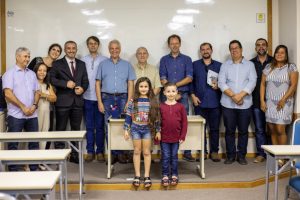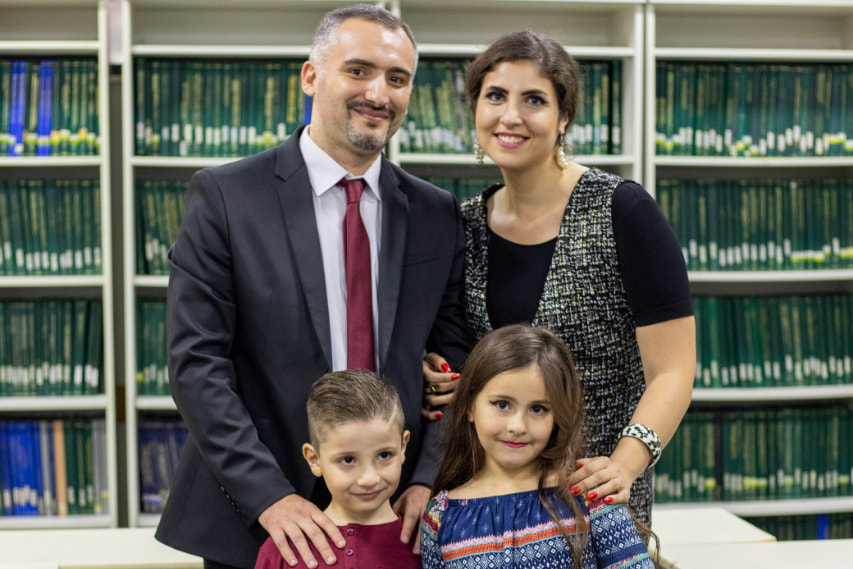São Paulo – The first doctorate thesis on environmental engineering of Federal University of Rio de Janeiro (URFJ) was submitted by a Syrian. In fact, Mohammad Najjar may already be regarded as a Brazilian too. “This is our country now. On August 29, last week, I got my ID! We’re Brazilians now,” stated he, who came to Brazil with his family in 2015.
Najjar was born in Latakia, Syria where he grew up and got his degree in architecture from Tishreen University. He also met his wife there, the economist Hind Zeitouneh, and married and had Nancy, now 7, and Khaled, 5 (pictured above). After getting his master’s degree in London, Najjar worked in his own architecture office and as a professor at a Syrian university. “Until the war started and, by 2015, I had to get out of the country. A great wave of kids abduction. My wife and I couldn’t imagine a life without them,” he told ANBA.
Our family’s first destination was Malaysia, where we spent two months. From there, our family examined our options and saw Brazil as a possibility of a safer migration. “Brazilian law helped a lot, because you could just get a visa and arrive at the airport, it was much safer to arrive as a refugee. We had neighbors in Syria, a family that decided to go to Germany, but both wife and the kids died on the beach. I didn’t want to repeat that. We were terrified to lose our family. And Brazil gave us that security,” he stated.
Visas on hand, the family arrived in Rio de Janeiro, where they live now. To legalize his status as a refugee, Najjar appealed to Cáritas, a humanitarian organization that operates in that state. With a connection at the institution, he was invited to give interviews to the Rio press. “A group of professors at UFRJ watched it and asked to meet me. Almost everything happed during my fist week. I’ve met them and they supported me. Luís Otávio is always by my side and my family’s. He is like brother in Brazil,” he said referring to professor Luís Otávio Cocito Araújo at the Civil Construction Department of Technology Center of UFRJ.
Doctor in environmental engineering
Araújo introduced him to another professor, Assed Haddad, who later became Najjar supervisor. His new friends taught the parents Portuguese and helped the children get a scholarship at a carioca school. In May 2016, UFRJ opened selection for a doctorate in Environmental Engineering. Encouraged by his Brazilian friends, Najjar applied. “They actually pushed me. They said: ‘you should do it, you have a master’s degree in London, a diploma in Syria.’ I applied and passed in every phase,” he said proudly.

The thesis he submitted last July featured a partnership between UFRJ and New South Wales University in Australia. “We published several articles. The thesis is on the life cycle of buildings and the calculation of energy consumption in overall civil construction. Sustainability is an international matter. We need to think on the future of energy, how we apply or set up renewable energy sources, solar panels, all this stuff,” he explained.
Now a doctor, the Syrian has already developed his postdoctoral research at the same university and prepares to publish a book with other professors from UFRJ and Australia. In parallel, he teaches Architecture at another foundation. “I intend to build up a strong curriculum. Ours thesis is international and the examiners’ board had six professor, two being foreigners,” Najjar said on the possibility of working with foreign universities and perhaps conducting part of his postdoc in Australia.
Brazil is now our country
Before the doctorate, his first learning experience was much more basic: the language. “I started speaking Portuguese in a very funny manner. Our children were our first teachers in the language. They used to correct our words. Until recently, my daughter would have to go buy groceries with me, since her Portuguese was much better than mine,” he said. Besides Nancy and Khaled, the couple has yet another daughter. Maria Lionela was born in Brazil. “We arrived in a country where we had no relatives. But now I have a great non-blood family, my friends,” Najjar said.
The family now tries to become financially established in their new home. Zeitouneh is also trying to get back to the job market and teaches English in a private school. “From 2015 to 2017, we managed to learn it all. My wife and I, together. She is thinking on studying pedagogy. Our plan is to stay in Brazil and that depends on the kind of job and our income. We don’t think about leaving, even if the war ends. I left all our possessions in Syria. This is a clean slate. And we just want to earn enough to sustain our family and nothing more than that,” Najjar said.
The doctor now says that he is open to work whether as a professor or an architect, his main interest areas, now in the country where he’s rebuilding his life. “My idea is always create a pretty strong resumé. And look for a job with a good income to sustain all of my family,” he explained.
Contact info
Mohammad Najjar: mnajjar@poli.ufrj.br
Translated by Guilherme Miranda




